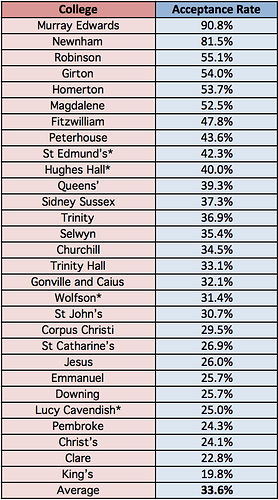How do acceptance rates change from college to college?
2 Replies
Some colleges are far more competitive than others, especially for subjects which they specialise in. For example, St John’s College Oxford has the best tutors for mathematics, and so usually ends up with the most applications and the best students.
However, this doesn’t mean that the college you apply to changes your changes of being admitted to the university as a whole. Each college “pools” applicants who they think have merit, but who they don’t have space to accept. These applicants are then considered by undersubscribed colleges. Although it’s difficult to determine whether being pooled harms your application compared with applying directly to a less competitive college, since there are whole bunch of confounding factors, in general it’s a pretty fair system, and you should probably apply to one of the colleges you like the most rather than trying to game it. Edit: Jamie’s point is fair, if the college you like the most happens to be the most competitive, you may want to reconsider.
While Richard raises a good point, being tactical about which college you apply for is important because while your overall chance of gaining admission into Oxford/Cambridge given the presence of the pool doesn’t vary particularly much, different colleges are of varying attractiveness so you can obtain a better outcome by strategizing about where your first choice college is.
Here you can see the average acceptance rate from the maintained sector by College 2015. This is relevant for UK state schools (not for internationals) however, the trends in acceptance rate and illustration of more competitive colleges is useful in general:
When I applied to Cambridge, I wanted to go to the most competitive college for Economics and felt I was a reasonable strong applicant with 8 A* and an A Level A* in Economics before I applied so I went ahead and applied to King’s College, Cambridge.
Your personal optimization should be a combination of personal preference for size, character of the college, location, faculty expertise, reputation and acceptance rate.
Given that you usually will be placed into less competitive colleges if you get accepted through the pool, it is important to choose your first choice college strategically with insight from an expert who can help assess these odds.
For example, imagine you knew with certainty you could get into St John’s but could not get into King’s College and if you got rejected from your first choice, you would end up at Girton. Although you may like King’s College more, it would make more sense to apply to St John’s because if you applied to King’s and got rejected, you would end up at Girton through the pool which you preferred less than St John’s.
